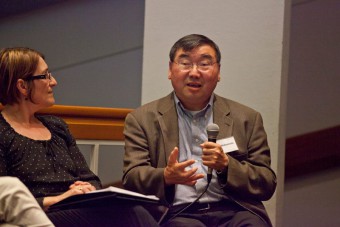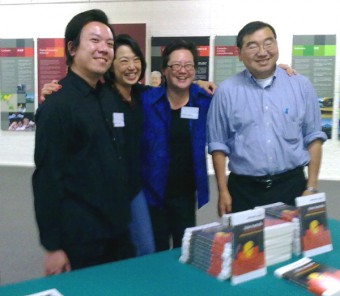
It’s an honour to be writing about Asian Australian studies at this important juncture in the AASRN’s history.
In this post, I would like to take the opportunity to contemplate the decade-long impact of the Network on my own intellectual practice through my association with Don Nakanishi, Professor Emeritus, inaugural director of the UCLA Asian American Studies Centre and a path-breaker in the field of Asian American studies.
In the time I knew him, I was also fortunate to count Don as a mentor, colleague and friend. My thoughts about the intersection between the AASRN, community building and the field of Asian Australian studies represent my own modest tribute to him.
Greatness and humility
I met Don at the second Asian Australian Identities conference in June 2007, where he moderated a keynote with one of the ALP’s emerging stars, Senator Penny Wong, just before she would take on the challenging responsibility for the transition to government under a new Labor government. Though I did not know this at the time, Don had become a frequent visitor to our shores, undertaking interviews and archival research on the character of Asian Australian politics since 1993.
We did an interview after that keynote, largely around his observations of Chinese Australian political participation in elite contexts. In that first meeting, I was struck by Don’s demeanour and character. He was patient with me. He exuded a sense of bemused calm. But no attribute was more important than the fact that Professor Nakanishi spoke to me, at the time a young PhD student, as a colleague.
After our interview, I went back to the books and discovered fragments of his long academic legacy.
In 1971, he had co-founded the Amerasia journal. In 1976 he was responsible for the very first National Asian Pacific American Political Almanac, what remains (now in its 15th edition) the most comprehensive compilation on the electoral participation of Asian Pacific Americans. I went on to read most of his essays on American politics, including “An Agenda for Research”, an article that transformed my view of the intersection between transnationalism and migrant political participation. Notably, Don had written this back in 1986.
In the time I knew him, Don was always a generous scholar. In my case, that generosity helped me finish a difficult doctorate, where ultimately I reconciled my postcolonial identity politics with some ugly truths about migrant political participation and more importantly formal politics. It was hard work ethically, but Don was always there to provide insight about intellectual honesty.
It seems the way he went about his academic career and his community advocacy was always with temperance, good will, and humility. I think it was because Don was always playing the long game. Certainly, these attributes left their mark on me.
Know thyself
The last time I saw Don was in Melbourne in 2015. Over a discussion about the significance of formal state-based apologies, he recounted an anecdote about his “Kibei” parents, whose migration trajectories took them—like Chinese “huaqiao”—between Los Angeles and Hiroshima, but landed them in one of the worst US incarceration camps during the Second World War. There were other specific details about their experience, but Don framed this so that I could comprehend the tangible impact of history and social injustice in shaping his life, as well as creating the seeds of social movements and the potential for transformative change.
The experience of internment had left the Japanese American community fragmented well into the 1960s. But the slow road to change created by the Redress Movement would eventuate in the Civil Liberties Act of 1988, delivering Japanese American and apology and reparations for their internment during the war.
It was evident to me from Don’s stories about his own past that racial ideology and marginality produces one recurrent, dangerous effect – the erasure of memory, and especially shared memory.
Dominant populations, who are unaffected or are beneficiaries of racial structures, predominantly move to ignore, quash, or reclaim the social memory of minorities. Communities affected by racism often over time turn away from their own trauma. The political role of community-engaged social research, and the role of institutionalising Asian American studies, was in part about ensuring that these histories and narratives survived.
Building community as a political act
Asian American Studies was born from the Asian American movement, which arose in the long decade of the 1960s, alongside the American civil rights and women’s movements, to push back against structures of discrimination and racism. The early institutionalisation of Asian American Studies across US higher education institutions were predominantly projects that extended this community-building task. The praxis of Asian American studies is grounded in the connection between scholarship and community.
When I look at Don’s career, his role as instigator and his long contribution to the field, it is clear that transformative change is cumulative, and requires us as individuals to marshall our resources, such as courage, imagination, and solidarity with one another, to build projects and outcomes in the world.
Equally as important, racial identities are not natural. They are provisional, certainly provisionally dependent upon the dynamics of a dominant culture, but also provisional in terms of potential purpose. The Asian American Studies that Don and hundreds of other US scholars built negotiated that purpose, sometimes separately, at the best of times strategically, as also interventions committed to radical political expression.
Ways forward
Don departed this world in sudden circumstances earlier this year. Commemorations of his life—something that I largely viewed via Facebook—provided me some solace that his legacy would live on through his American family and colleagues.
There are many reasons to also take heart from the lessons he left us in Australia. On one hand we can look to them for guidance here, but there are just as many things we can learn about the unique historical conditions that made Asian American studies possible and distinguish it from our own dynamics of field formation.
The origin of what it means to be Asian Australian owes no allegiances. Its roots are in our own geography and history. As a field, we could tentatively situate the beginning in 1999 with the first Asian Australian Identities conference, though the public use of this phrase as an identity position was established over a decade before by other Asian Australian advocates and activists.
Beginning with this conference, Asian Australian Studies has sustained at least two strong interlocking themes, the role of literary, performative and cultural analysis as a way to analyse and critique racial categorisation and the aim of better understanding the Asian–Australian diasporic experience. In more recent years, this has deepened and extended into cultural heritage, community studies, and – through other groups – public policy and political activism.
I take from my lessons with Don that the way forward must involve excavating our shared pasts and unpacking the social dynamics connecting us to our extended communities, be they migrant, refugee, feminist, artistic, political, religious, transnational, or LGBTIQ.
Certainly, we cannot and should not be bogged down in the histories of other movements or fields. The history we make must be our own.
To learn more about Don Nakanishi, check out ‘The Political World of Asian American: A Tribute to Don T. Nakanishi,’ a special edition of Amerasia, Vol. 35, No. 3 (2009).


